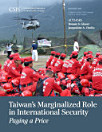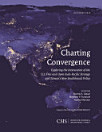U.S.-Taiwan Relations: Will China's Challenge Lead to a Crisis?
About this ebook
This book rightsizes the risks confronting Taiwan by taking a holistic view of China’s national ambitions and Taiwan’s role in them, China’s strategies for pursuing unification with Taiwan, and America’s most effective responses. Contrary to many other books on the market, the authors make the case for why conflict in the Taiwan Strait is not preordained, and in fact, it would be strategic folly for the United States to conclude that conflict is inescapable.
Hass, Bush, and Glaser argue that the center of gravity for determining the future of Taiwan is the will of Taiwan’s 23 million people. American policy should focus on their hopes and fears if the United States wishes to maintain influence over events in the Taiwan Strait. This calls for American resoluteness and steadiness of purpose in fortifying Taiwan’s economic dynamism, political autonomy, military preparedness, and dignity and respect on the world stage. Maintaining credible military deterrence is the minimum threshold, not the measure of success. U.S.-Taiwan Relations will be an invaluable resource for students, researchers, and journalists to understand this critical moment in U.S. foreign policy.
About the author
Ryan Hass is the Chen-Fu and Cecilia Yen Koo Chair in Taiwan Studies at the Brookings Institution. Bonnie Glaser is Managing Director of the Indo-Pacific Program at the German Marshall Fund of the United States. Richard Bush is author of seven books, including most recently, Difficult Choices: Taiwan’s Quest for Security and the Good Life (Brookings Press, 2021).







